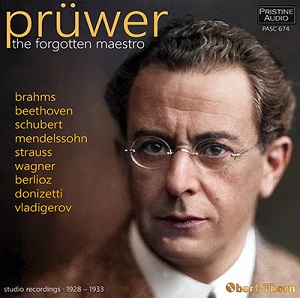
Julius Prüwer (conductor)
The Forgotten Maestro
Berlin Philharmonic Orchestra, Berlin-Charlottenburg Opera Orchestra, Berlin State Opera Orchestra
rec. 1928-1933
Pristine Audio PASC674 [72 + 77]
Julius Prüwer (1873-1943) was born in Vienna, and for nearly three decades was active in Breslau where he became director of the city’s opera company, eventually arriving in Berlin in the early 1920s. As a professor at the Hochschule für Musik, one of his most prominent students was Ferdinand Leitner. He was given lighter material to conduct by the Berlin Philharmonic but was speedily removed in 1933 and emigrated to the United States in 1939. He resumed the remnants of his conducting career but didn’t survive long, dying in 1943. I also read somewhere that he’d given the first performance of Tristan in St Petersburg back in 1898.
As far as his recordings go he is perhaps best known for his accompaniment to Brailowsky in the Chopin concertos (review). However, many of his recordings were standard accompanying ventures, usually for Polydor – half his discography in fact is taken up with these duties. You’ll find him on disc accompanying such singers such as Elisabeth Ohms (review), the Polish soprano Hedwig von Debicka, baritones Wilhelm Rode and Willi Domgraf-Fassbaender and others. This twofer focuses on his orchestral legacy, reissuing, it seems, everything here for the first time.
Because Furtwängler – and others – in Berlin recorded so much core repertory with the orchestra, Prüwer was used as a kind of gap-filler and had limited opportunities to record the symphonic canon. One thing he was allowed to record was Schubert’s Unfinished, in 1928. This is a symphony that encourages, then and now, a wide disparity of responses. With some conductors both movements take the same time, with others the first movement is substantially longer than the second. Some rather hustle through it, whilst others take a more grand seigneurial attitude. Prüwer prefers relatively stately tempi and as producer Mark Obert-Thorn rightly notes, the first movement development section is, indeed, broad. However, it’s not static, holds the tempo decisions steadily, and generates a strong sense of drama with powerful control. Additionally, Prüwer, though clearly from a generation for whom metrical flexibility was an important interpretive-architectural component of their music making, shows malleability in blocks, so that rather than sudden or erratic movement it’s more a question of mass. Occasionally this runs the risk of being dogged. I suspect there’s a side join at 4:11 in the second movement.
These qualities are reinforced in Beethoven’s Egmont Overture where his steady tempos eventually drive through to the climax with an inevitability born of the same control he exhibited in Schubert. This must have been one of the first recordings of Brahms’ Academic Festival Overture, made roughly at the same time that Klemperer (a touch later, in fact, in 1931), and Fritz Stiedry, were recording it with the Berlin State Opera Orchestra; a sturdy though not outstanding reading. The two Brahms Hungarian Dances form one of those familiar popular couplings though I find the rubati a touch overdone in No.5.
He proves a stylistically adept conductor of Johann Strauss and he even has the advantage of the zither, played by Ernst Rommel, in an unusually (for the time) complete version of Tales from the Vienna Woods, here with the Berlin-Charlottenburg Opera Orchestra. There’s a thoughtful, committed recording of the overture from Benvenuto Cellini and a lithe, attractive reading of Thomas’ overture to Raymond, rare repertoire then and now. The succession of overtures continues with Donizetti, whose overture to La fille du regiment is dispatched with confident swagger. Anton Rubinstein’s Toréador et Andalouse, Op. 103, No. 7, originally for piano four-hands, is played with slinky Iberian passion and a hint of exotica. The latest disc is Luigini’s Ballet égyptien, recorded for Kristall in 1933, a month before he was sacked from his Berlin Philharmonic position. This was also a relatively early orchestral Kristall disc, a sequence beginning with the catalogue number 1000 – the Luigini is numbered 1051-52, so perhaps he’d been contracted to make a sequence of discs for the label, which never came to fruition. This the First Suite of four numbers and is played with considerable panache. The record is vivid too, especially when the winds pipe up.
Though this was the last piece he was to record, perhaps the most interesting is the 1929 recording of Vladigerov’s Bulgarian Suite. This was just the kind of colourful, ethnically-slanted thing for Weimar Berlin and Prüwer and, here, the forces of the Berlin State Opera Orchestra, do it proud. The highlight is probably the second movement Lied, on two 78 sides, and very evocatively projected.
Finely transferred from a variety of pressings, both German and foreign, this twofer offers an introductory package to a lesser-known conductor of what one would have to call the second tier. Overlooked he may have been but devoid of talent he most certainly wasn’t.
Jonathan Woolf
Previous review: Gregor Tassie (January 2021)
Availability: Pristine ClassicalContents
Ludwig van Beethoven (1770-1827) Egmont, Op 84 – Overture (1810)
Franz Schubert (1797-1828) Symphony No 8 in B minor, D759 “Unfinished” (1822)
Felix Mendelssohn (1809-1847) Hebrides Overture, Op 26 (1830-2)
Richard Wagner (1813-1883) Rienzi – Overture (1838-40)
Johannes Brahms (1833-1897) Academic Festival Overture, Op 80, (1880), Hungarian Dances, No 5 in G minor, No 6 in D major (1879)
Johann Strauss II (1825-1899) Tales from the Vienna Woods, Waltz, Op 325 (1868)
Hector Berlioz (1803-1869) Benvenuto Cellini, Op 23 – Overture (1834-7)
Ambroise Thomas (1811-1896) Raymond – Overture (1851)
Gaetano Donizetti (1797-1848) The Daughter of the Regiment – Overture (1839)
Alexandre Luigini (1850-1906) Ballet égyptien, Op 12 (1875)
Anton Rubinstein (1829- 1894) Toréador et Andalouse, Op 103, No 7 (1880)
Pancho Vladigerov (1899-1978) Bulgarian Suite, Op 21 (1926)


















